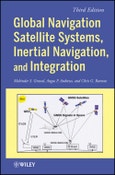An updated guide to GNSS, and INS, and solutions to real–world GNSS/INS problems with Kalman filtering
Written by recognized authorities in the field, this third edition of a landmark work provides engineers, computer scientists, and others with a working familiarity of the theory and contemporary applications of Global Navigation Satellite Systems (GNSS), Inertial Navigational Systems, and Kalman filters. Throughout, the focus is on solving real–world problems, with an emphasis on the effective use of state–of–the–art integration techniques for those systems, especially the application of Kalman filtering. To that end, the authors explore the various subtleties, common failures, and inherent limitations of the theory as it applies to real–world situations, and provide numerous detailed application examples and practice problems, including GNSS–aided INS (tightly and loosely coupled), modeling of gyros and accelerometers, and SBAS and GBAS.
Drawing upon their many years of experience with GNSS, INS, and the Kalman filter, the authors present numerous design and implementation techniques not found in other professional references. The Third Edition includes:
- Updates on the upgrades in existing GNSS and other systems currently under development
- Expanded coverage of basic principles of antenna design and practical antenna design solutions
- Expanded coverage of basic principles of receiver design and an update of the foundations for code and carrier acquisition and tracking within a GNSS receiver
- Expanded coverage of inertial navigation, its history, its technology, and the mathematical models and methods used in its implementation
- Derivations of dynamic models for the propagation of inertial navigation errors, including the effects of drifting sensor compensation parameters
- Greatly expanded coverage of GNSS/INS integration, including derivation of a unified GNSS/INS integration model, its MATLAB® implementations, and performance evaluation under simulated dynamic conditions
The companion website includes updated background material; additional MATLAB scripts for simulating GNSS–only and integrated GNSS/INS navigation; satellite position determination; calculation of ionosphere delays; and dilution of precision.
Table of Contents
Preface xxviiAcknowledgments xxxi
Acronyms and Abbreviations xxxiii
1 Introduction, 1
1.1 Navigation, 1
1.2 GNSS Overview, 4
1.3 Inertial Navigation Overview, 10
1.4 GNSS/INS Integration Overview, 30
Problems, 32
References, 32
2 Fundamentals of Satellite Navigation Systems, 35
2.1 Navigation Systems Considered, 35
2.2 Satellite Navigation, 36
2.3 Time and GPS, 46
2.4 Example: User Position Calculations with No Errors, 48
Problems, 51
References, 53
3 Fundamentals of Inertial Navigation, 54
3.1 Chapter Focus, 54
3.2 Basic Terminology, 55
3.3 Inertial Sensor Error Models, 59
3.4 Sensor Calibration and Compensation, 63
3.5 Earth Models, 68
3.6 Hardware Implementations, 77
3.7 Software Implementations, 83
3.8 INS Performance Standards, 101
3.9 Testing and Evaluation, 102
3.10 Summary, 103
Problems, 104
References, 106
4 GNSS Signal Structure, Characteristics, and Information Utilization, 108
4.1 Legacy GPS Signal Components, Purposes, and Properties, 109
4.2 Modernization of GPS, 132
4.3 GLONASS Signal Structure and Characteristics, 141
4.4 Galileo, 144
4.5 Compass/BD, 146
4.6 QZSS, 146
Problems, 148
References, 150
5 GNSS Antenna Design and Analysis, 152
5.1 Applications, 152
5.2 GNSS Antenna Performance Characteristics, 152
5.3 Computational Electromagnetic Models (CEMs) for GNSS Antenna Design, 164
5.4 GNSS Antenna Technologies, 166
5.5 Principles of Adaptable Phased–Array Antennas, 180
5.6 Application Calibration/Compensation Considerations, 187
Problems, 189
References, 190
6 GNSS Receiver Design and Analysis, 193
6.1 Receiver Design Choices, 193
6.2 Receiver Architecture, 199
6.3 Signal Acquisition and Tracking, 204
6.4 Extraction of Information for User Solution, 223
6.5 Theoretical Considerations in Pseudorange, Carrier Phase, and Frequency Estimations, 231
6.6 High–Sensitivity A–GPS Systems, 235
6.7 Software–Defi ned Radio (SDR) Approach, 242
6.8 Pseudolite Considerations, 243
Problems, 244
References, 246
7 GNSS Data Errors, 250
7.1 Data Errors, 250
7.2 Ionospheric Propagation Errors, 251
7.3 Tropospheric Propagation Errors, 263
7.4 The Multipath Problem, 264
7.5 Methods of Multipath Mitigation, 266
7.6 Theoretical Limits for Multipath Mitigation, 283
7.7 Ephemeris Data Errors, 285
7.8 Onboard Clock Errors, 285
7.9 Receiver Clock Errors, 286
7.10 SA Errors, 288
7.11 Error Budgets, 288
Problems, 289
References, 291
8 Differential GNSS, 293
8.1 Introduction, 293
8.2 Descriptions of Local–Area Differential GNSS (LADGNSS), Wide–Area Differential GNSS (WADGNSS), and Space–Based Augmentation System (SBAS), 294
8.3 GEO with L1L5 Signals, 299
8.4 GUS Clock Steering Algorithm, 307
8.5 GEO Orbit Determination (OD), 310
8.6 Ground–Based Augmentation System (GBAS), 316
8.7 Measurement/Relative–Based DGNSS, 319
8.8 GNSS Precise Point Positioning Services and Products, 323
Problems, 325
References, 326
9 GNSS and GEO Signal Integrity, 328
9.1 Introduction, 328
9.2 SBAS and GBAS Integrity Design, 332
Problems, 325
References, 326
10 Kalman Filtering, 350
10.1 Introduction, 350
10.2 Kalman Filter Correction Update, 354
10.3 Kalman Filter Prediction Update, 365
10.4 Summary of Kalman Filter Equations, 375
10.5 Accommodating Time–Correlated Noise, 377
10.6 Nonlinear and Adaptive Implementations, 384
10.7 Kalman–Bucy Filter, 395
10.8 Host Vehicle Tracking Filters for GNSS, 397
10.9 Alternative Implementations, 413
10.10 Summary, 425
Problems, 426
References, 428
11 Inertial Navigation Error Analysis, 430
11.1 Chapter Focus, 430
11.2 Errors in the Navigation Solution, 432
11.3 Navigation Error Dynamics, 442
11.4 Inertial Sensor Noise, 459
11.5 Sensor Compensation Errors, 461
11.6 Software Sources, 467
11.7 Summary, 468
Problems, 470
References, 471
12 GNSS/INS Integration, 472
12.1 Chapter Focus, 472
12.2 GNSS/INS Integration Overview, 473
12.3 Unifi ed Model for GNSS/INS Integration, 479
12.4 Performance Analysis, 485
12.5 Other Integration Issues, 490
12.6 Summary, 492
Problem, 493
References, 494
Appendix A Software, 495
Appendix B Coordinate Systems and Transformations, 500
Index 551








